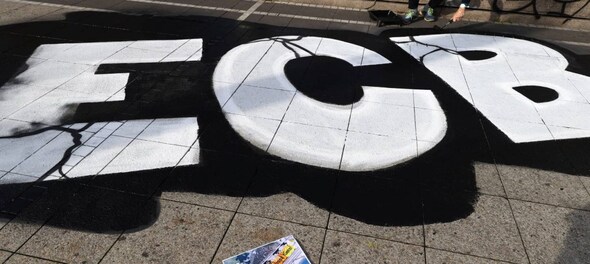
The European Central Bank left interest rates unchanged for the first time in more than a year as it gauges whether an unprecedented series of hikes will succeed in subduing inflation.
Following last month’s knife-edge decision to lift the deposit rate to a record 4%, policymakers kept it there on Thursday — matching the predictions of all economists surveyed by Bloomberg.
They reiterated in a statement that holding borrowing costs at that level for long enough will make a “substantial contribution” to bringing consumer-price gains back to the 2% target.
The euro held losses against the dollar, while German bonds edged higher.
Like its peers in the US and the UK, the ECB hasn’t shut the door to further hikes, should inflation fail to ease quickly enough. But there’s little doubt among economists and investors that the high point for euro-zone borrowing costs has been reached following 10 back-to-back moves starting in July 2022.
That’s fueling bets on when the first rate cuts will arrive, with investors buying into ECB’s “higher-for-longer” narrative by pricing reductions from next fall — even as the region is at risk of finally succumbing to a recession.
Officials aren’t offering many clues, focusing instead on other policy levers — primarily, the €1.7 trillion ($1.8 trillion) pandemic bond portfolio, known as PEPP.
Winding down PEPP more quickly than currently planned would bolster monetary tightening and accelerate a wider exit from crisis-era stimulus. But such a move may prove controversial as Middle East tensions threaten to push oil prices higher, Italy’s government finances worry investors and the euro area’s economy sputters.
The Governing Council said that the incoming data have “broadly confirmed” its previous assessment of the medium-term price outlook. “Inflation is still expected to stay too high for too long, and domestic price pressures remain strong,” it said.
President Christine Lagarde will explain the decision at a news conference at 3:45 p.m. in Athens, where the Governing Council gathered for one of its regular meetings beyond its Frankfurt headquarters.
The ECB’s announcement is part of a slew of global rate meetings. On Wednesday, the Bank of Canada kept rates unchanged for a second straight time, while leaving open the possibility of more tightening. Next week will feature decisions by the Federal Reserve and the Bank of England. Both are expected to hold fire.
Since their last policy gathering in September, ECB officials have seen inflation slow more than anticipated. It could abate to a two-year low of about 3% this month, according to a Bloomberg Economics estimate.
But while the surge in rates is benefiting lenders like Deutsche Bank, third-quarter gross domestic product numbers for the 20-nation euro zone, due next week, are likely to show meager growth at best. Surveys of purchasing managers for October signaled that both the manufacturing and services sectors are mired in downturns.
Germany, the currency bloc’s largest economy, is also its biggest concern as it faces the prospect of a second recession in just over a year. ECB policymakers will have to wait until December for fresh staff projections that will look all the way into 2026.
Check out our in-depth Market Coverage, Business News & get real-time Stock Market Updates on CNBC-TV18. Also, Watch our channels CNBC-TV18, CNBC Awaaz and CNBC Bajar Live on-the-go!


BJP's Hindi heartland dominance faces test in phase 3 polls
May 2, 2024 9:14 PM
Lok Sabha Election: Re-elections at a Ajmer booth after presiding officer misplaces register of voters
May 2, 2024 4:54 PM

